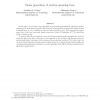Free Online Productivity Tools
i2Speak
i2Symbol
i2OCR
iTex2Img
iWeb2Print
iWeb2Shot
i2Type
iPdf2Split
iPdf2Merge
i2Bopomofo
i2Arabic
i2Style
i2Image
i2PDF
iLatex2Rtf
Sci2ools
116
click to vote
FOCS
2009
IEEE
2009
IEEE
Faster Generation of Random Spanning Trees
In this paper, we set forth a new algorithm for generating approximately uniformly random spanning trees in undirected graphs. We show how to sample from a distribution that is within a multiplicative (1 + δ) of uniform in expected time O(m √ n log 1/δ). This improves the sparse graph case of the best previously known worst-case bound of O(min{mn, n2.376 }), which has stood for twenty years. To achieve this goal, we exploit the connection between random walks on graphs and electrical networks, and we use this to introduce a new approach to the problem that integrates discrete random walk-based techniques with continuous linear algebraic methods. We believe that our use of electrical networks and sparse linear system solvers in conjunction with random walks and combinatorial partitioning techniques is a useful paradigm that will find further applications in algorithmic graph theory. ∗ Research partially supported by NSF grant CCF-0843915. † Research partially supported by Fulb...
Electrical Networks | FOCS 2009 | Random Spanning Trees | Random Walks | Theoretical Computer Science |
Related Content
| Added | 20 May 2010 |
| Updated | 20 May 2010 |
| Type | Conference |
| Year | 2009 |
| Where | FOCS |
| Authors | Jonathan A. Kelner, Aleksander Madry |
Comments (0)

